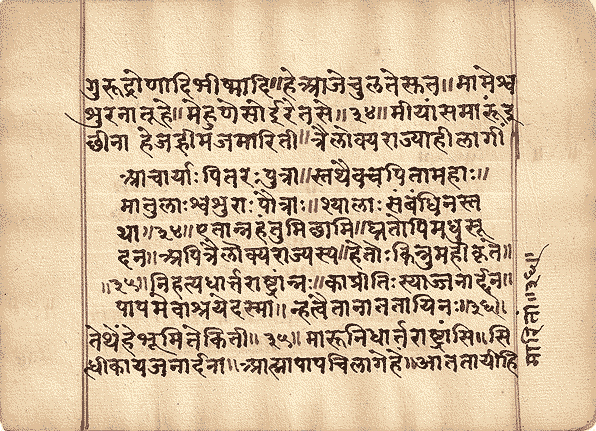
etān na hantum icchāmi ghnato ‘pi madhusūdana
api trai-lokya-rājyasya hetoḥ kiṃ nu mahī-kṛte
Update RequiredTo play the media you will need to either update your browser to a recent version or update your Flash plugin.
he madhusūdana (O slayer of Madhu!),
[
aham]
(I) ghnataḥ api (although they are killing) etān (them) hantuṁ (to kill) na icchāmi (I do not desire),
trai-lokya-rājasya hetoḥ api (even for the sake of the kingdom of the three worlds),
kiṁ nu (what [to say]?) mahī-kṛte (for the sake of [ruling] the earth).
| etān |
– |
etat sn. 2n.3 m. – them; |
| na |
– |
av. – not; |
| hantum |
– |
√han (to kill) inf. – to kill; |
| icchāmi |
– |
√iṣ (to desire) Praes. P 3v.1 – I desire; |
| ghnataḥ |
– |
ghnant (√han – to kill) PPr 2n.3 m. – who are killing; |
| api |
– |
av. – although, moreover, besides, even; |
| madhu-sūdana |
– |
madhu-sūdana 8n.1 m. – O slayer of Madhu (from: madhu – sweet, name of a demon; √sūd – to put in order, to kill, sūdana – killing, destroying); |
| api |
– |
av. – although, moreover, besides, even; |
| trai-lokya-rājyasya |
– |
trai-lokya-rājya 6n.1 n.; TP: trayāṇāṁ lokāṇāṁ rājyasyeti – of the kingdom of the three worlds (from: tri – three, trai – triple, found in compounds; loka – world; trai-lokya – the three worlds; √rāj – to reign, PF rājya – to be ruled, a kingdom, power); |
| hetoḥ |
– |
av. (6n.1) – for the cause, for the reason – requires genitive (from: hetu – cause, motive, reason); |
| kim |
– |
av. – whether? how? why? wherefrom? (from: kim – what?); |
| nu |
– |
av. – indeed (used to give emphasis); |
| mahī-kṛte |
– |
av. (7n.1) – for the sake of [ruling] the earth (from: √mah – to magnify, mahant – great, mahī – earth, powerful; √kṛ – to do, kṛta PP – done, made, kṛte – av. on account of, for the sake of); |
mahī-kṛte→ mahīpate (O powerful ruler of the earth!);
no commentary up to the verse BhG 2.10
no commentary up to the verse BhG 1.47
no commentary up to the verse BhG 2.11
etad eva prapañcayati kiṃ no rājyena ity ādi sārdha-dvayena | ta ime iti | yad-artham asmākaṃ rājyādikam apekṣitam te ete prāṇa-dhanāni tyaktvā tyāgam aṅgīkṛtya yuddhārtham avasthitāḥ | ataḥ kim asmākaṃ rājyādibhiḥ kṛtyam ity arthaḥ |
nanu yadi kṛpayā tvam etān na haṃsi tarhi tvām ete rājya-lobhena haniṣyanty eva | atas tvam evaitān hatvā rājyaṃ bhuṅkṣveti | tatrāha etān ity ādi sārdhena | ghnato ‚pi asmān mārayato ‚pi etān | apīti | trailokya-rājyasyāpi hetoḥ tat-prāpty-artham api hantuṃ necchāmi | kiṃ punar mahīmātra-prāptaya ity arthaḥ
no commentary up to the verse BhG 1.36
govindeti | gāḥ sarvendriya-vṛttīḥ vindasīti tvam eva me manogataṃ pratīhīty arthaḥ | rājyādy-anākāṅkṣāyāṃ hetum āha yeṣām iti | prāṇān prāṇāśāṃ dhanāni9 dhanāśām iti laksaṇayā bodhyam | sva-prāṇa-vyaye ‚pi sva-bandhu-sukhārthā rājya-spṛhā syāt teṣām apy atra nāśa-prāpter apārthaiva yuddhe pravṛttir iti bhāvaḥ |
nanu tvaṃ cet kāruṇikas etān na hanyās tarhi te sva-rājyaṃ niṣkaṇṭakaṃ kartuṃ tvām eva hanyur iti cet tatrāh etān iti | māṃ ghnato ‚pi hiṃsato ‚py etān hantum ahaṃ necchāmi | trailokya-rājyasya prāptaye ‚pi kiṃ punar bhū-mātrasya |
nanv anvayān hitvā dhṛtarāṣṭra-putrā eva hantavyā, bahu-duḥkha-dātṝṇāṃ teṣāṃ ghāte sukha-sambhavād iti cet tatrāha nihatyeti | dhārtarāṣṭrān duryodhanādīn nihatya sthitānāṃ naḥ pāṇḍāvānāṃ kā prītiḥ prasannatā syān na kāpīti acira-sukhābhāsa-spṛhayā ciratara-naraka-hetu-bhrāṛho na yogya iti bhāvaḥ | he janārdaneti yady ete hantavyās tarhi bhūbhārāpahārī tvam eva tān hahi pareśasya te pāpa-gandha-sambandho na bhaved iti vyajyate

